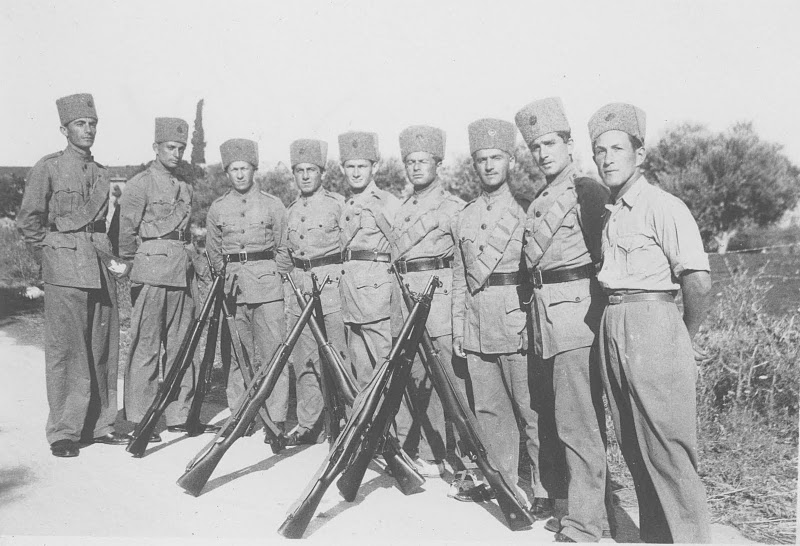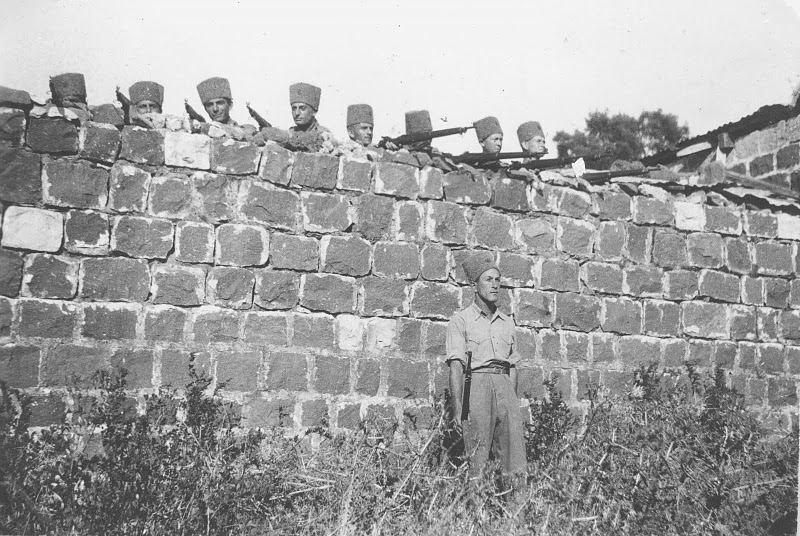Special Night Squads on:
[Wikipedia]
[Google]
[Amazon]
 The Special Night Squads (SNS) (
The Special Night Squads (SNS) (
''Counterinsurgency in Modern Warfare,''
Bloomsbury Publishing, 2011 p.33 Wingate selected his men personally, among them
 Historian Simon Anglim noted that the Special Night Squads were inspired by similar units, such as the Gurkha Frontier Force which was active in the North-West Frontier, the
Historian Simon Anglim noted that the Special Night Squads were inspired by similar units, such as the Gurkha Frontier Force which was active in the North-West Frontier, the
''Orde Wingate and the British Army, 1922-1944,''
Routledge, 2015 pp.59-60. According to Israeli military historian
 The Special Night Squads (SNS) (
The Special Night Squads (SNS) (Hebrew
Hebrew (; ; ) is a Northwest Semitic language of the Afroasiatic language family. Historically, it is one of the spoken languages of the Israelites and their longest-surviving descendants, the Jews and Samaritans. It was largely preserved ...
: ''Plagot Ha'Layla Ha'Meyukhadot'', פלוגות הלילה המיוחדות) was a joint British-Jewish counter-insurgency military unit, established by Captain Orde Wingate in Mandatory Palestine
Mandatory Palestine ( ar, فلسطين الانتدابية '; he, פָּלֶשְׂתִּינָה (א״י) ', where "E.Y." indicates ''’Eretz Yiśrā’ēl'', the Land of Israel) was a geopolitical entity established between 1920 and 1948 ...
in 1938 during the 1936–1939 Arab revolt. The SNS basically comprised British infantry soldiers, together with some men drawn from the Jewish Supernumerary Police. Total unit strength was 100 by 1938.Daniel Marston, Carter Malkasian''Counterinsurgency in Modern Warfare,''
Bloomsbury Publishing, 2011 p.33 Wingate selected his men personally, among them
Yigal Allon
Yigal Allon ( he, יגאל אלון; 10 October 1918 – 29 February 1980) was an Israeli politician, commander of the Palmach, and general in the Israel Defense Forces, IDF. He served as one of the leaders of Ahdut HaAvoda party and the Labor P ...
and Moshe Dayan, and trained them to form small mobile striking units. Wingate also collaborated with the Jewish paramilitary formation, the Haganah, reinforcing his unit with some of Haganah's Fosh commandos. Given British opposition to the formal creation of Jewish military units, it is not clear to what degree the Mandatory authorities were aware of the exact details of Wingate's operations in this regard.
Creation and deployment
 Historian Simon Anglim noted that the Special Night Squads were inspired by similar units, such as the Gurkha Frontier Force which was active in the North-West Frontier, the
Historian Simon Anglim noted that the Special Night Squads were inspired by similar units, such as the Gurkha Frontier Force which was active in the North-West Frontier, the Royal Irish Constabulary
The Royal Irish Constabulary (RIC, ga, Constáblacht Ríoga na hÉireann; simply called the Irish Constabulary 1836–67) was the police force in Ireland from 1822 until 1922, when all of the country was part of the United Kingdom. A separate ...
(RIC), which had unsuccessfully attempted to suppress the Irish War of Independence, and the g-men of the Federal Bureau of Investigation
The Federal Bureau of Investigation (FBI) is the domestic intelligence and security service of the United States and its principal federal law enforcement agency. Operating under the jurisdiction of the United States Department of Justice, ...
(FBI).
Wingate, an intelligence officer of the British Army's General Headquarters (GHQ) in Jerusalem
Jerusalem (; he, יְרוּשָׁלַיִם ; ar, القُدس ) (combining the Biblical and common usage Arabic names); grc, Ἱερουσαλήμ/Ἰεροσόλυμα, Hierousalḗm/Hierosóluma; hy, Երուսաղեմ, Erusałēm. i ...
, examined sabotage and weapon smuggling operations in northern Palestine ( Galilee). During March 1938, after several weeks of experimental ambushes and patrols, he had gained permission from the General Officer Commanding (GOC) in Palestine, Lieutenant-General Archibald Wavell, to establish a joint British-Jewish unit for night operations against the Arab insurgents. However, the Jewish Agency
The Jewish Agency for Israel ( he, הסוכנות היהודית לארץ ישראל, translit=HaSochnut HaYehudit L'Eretz Yisra'el) formerly known as The Jewish Agency for Palestine, is the largest Jewish non-profit organization in the world. ...
had opposed this venture at first, resulting in its postponement until early June.
The new GOC in Palestine, Lieutenant-General Robert Haining
General Sir Robert Hadden Haining, (28 July 1882 – 15 September 1959) was a senior British Army officer during the Second World War.
Early life and education
Haining was born in Chester, the eldest son of Dr. William Haining and Mary Ellen Ro ...
, had also approved Wingate's proposal to establish a "Night Movement Group", and the SNS became operative on early June, 1938. The military historian Hew Strachan has described the tactics Wingate employed as a form of state terrorism
State terrorism refers to acts of terrorism which a state conducts against another state or against its own citizens.Martin, 2006: p. 111.
Definition
There is neither an academic nor an international legal consensus regarding the proper def ...
, and its mode of operation eventually to lead to allegations that Wingate had effectively organized these nights squads into Jewish 'murder gangs' or 'death squads'.Simon Angli''Orde Wingate and the British Army, 1922-1944,''
Routledge, 2015 pp.59-60. According to Israeli military historian
Martin van Creveld
Martin Levi van Creveld ( he, מרטין ון קרפלד; born 5 March 1946) is an Israeli military historian and theorist.
Life and career
Van Creveld was born in the Netherlands in the city of Rotterdam to a Jewish family. His parents, Leon a ...
, their training included "how to kill without compunction, how to interrogate prisoners by shooting every tenth man to make the rest talk; and how to deter future terrorists by pushing the heads of captured ones into pools of oil and then freeing them to tell the story".
The 16th Infantry Brigade, under Brigadier John Fullerton Evetts
Lieutenant General Sir John Fullerton Evetts CB, CBE, MC (30 June 1891 – 21 December 1988) was a senior British Army officer.
Early life and First World War
Born in 1891 in Naini Tal, West Bengal, India, John Fullerton Evetts was educated a ...
, supplied three twelve-man squads, including officers, to the new unit. The men were taken from the Royal Ulster Rifles (squad commanded by Lieutenant Bala Bredin), the Royal West Kent Regiment (squad commanded by Lt. Michael "Mike" Grove) and the Manchester Regiment (squad commanded by commanded by Lt. Rex King-Clark, Robert "Rex" King-Clark).
Twenty-five Jews were assigned to the unit as supernumerary policemen, all of them Haganah members. The Jews were selected by Haganah regional commanders and by Yitzhak Sadeh, commander of the FOSH units in the Haganah. Later, 50 more Jews were assigned to the SNS, also from Haganah cadres. The success of the SNS caused the establishment of a fourth SNS-like unit in the Plain of Sharon, tasked with guarding the electric power line. During 1939, every British brigade in Palestine established their own Special Night Squads, although without Jewish participation.
Wingate left the SNS in October 1938, for a leave in England. During his leave he was involved with the Zionism, Zionist opposition to the Woodhead Commission report, meeting with such notables as Malcolm MacDonald, then secretary of the colonies, Max Aitken, Lord Beaverbrook, Beaverbrook and Winston Churchill, Churchill. This was frowned upon by Wingate's commanders, who dismissed him from command of the SNS and returned him to GHQ intelligence during November 1938. Bredin replaced Wingate as commander of the SNS, until it was disbanded.
The SNS continued to operate in the original form until January 1939 when, due to White Paper of 1939, British policy change, the Jewish supernumeraries were forbidden from participating in offensive operations. Thereafter, the Jewish SNS served mainly on prison guard and garrison duties. They were disbanded during September 1939.
The British government eventually considered Wingate to be a security risk. He was posted out of Palestine and his passport was stamped "NOT ALLOWED TO ENTER PALESTINE". The Special Night Squads came to be considered one of the first special forces units constituted by the British and have been seen by some historians as being a forerunner of the Special Air Service (SAS).
Operational activities
The Special Night Squads' primary task was to defend the Iraq Petroleum Company pipeline, which was frequently attacked by Arab insurgents. The squads also raided known insurgent bases, such as the villages of Daburiyya and Khirbat Lid. The force's success caused the cessation of attacks on the pipeline and brought a decrease of insurgent activity in the area. It is presumed that about 12.5% of all guerrilla casualties during 1938 were caused by the SNS, which had lost only two of its men (Pvt. Stephen Chapman from the Royal West Kents and supernumerary Yosef Ben-Moshe) in action.F or the unit's actions in Palestine, Wingate was awarded the Distinguished Service Order (DSO), and three SNS officers were awarded the Military Cross (MC). Several soldiers and supernumeraries were also awarded medals and citations.Criticism
Israeli historian Yoram Kaniuk writes:The operations came more frequently and became more ruthless. The Arabs complained to the British about Wingate's brutality and harsh punitive methods. Even members of the Notrim, field squads complained... that during the raids on Bedouin encampments Wingate would behave with extreme viciousness and fire mercilessly. Wingate believed in the principle of surprise in punishment, which was designed to confine the gangs to their villages. More than once he had lined rioters up in a row and shot them in cold blood. Wingate did not try to justify himself; weapons and war cannot be pure.Field Marshal Bernard Montgomery, Bernard Montgomery, 1st Viscount Montgomery of Alamein, who as commander of Northern Palestine had authorized the SNS, told Moshe Dayan during 1966 that he considered Wingate to have "been mentally unbalanced and that the best thing he ever did was to get killed in a plane crash in 1944".van Creveld, 2004, p. 115.
Footnotes
References
*Brown, Judith and Louis, Roger (1999). ''The Oxford History of the British Empire''. Oxford: Oxford University Press. *Martin van Creveld, van Creveld, Martin (2004). ''Moshe Dayan''. Weidenfeld and Nicolson. *Goodspeed, Michael (2001). ''When Reason Fails: Portraits of Armies at War: America, Britain, Israel, and the Future''. Greenwood. *Kaniuk, Yoram (2001). ''Commander of the Exodus''. Grove Press. *Katz, Sam (1988). ''Israeli Units Since 1948''. Osprey Publishing. *Oring, Elliott (1981). ''Israeli Humor: The Content and Structure of the Chizbat of the Palmah''. Albany: State University of New York Press. *Rankin, Nicholas (2009). ''A Genius for Deception: How Cunning Helped the British Win Two World Wars.'' Oxford University Press. {{Authority control 1936–1939 Arab revolt in Palestine Organizations based in Mandatory Palestine History of Mandatory Palestine Law enforcement in Mandatory Palestine Militant Zionist groups Military units and formations established in 1938 Military units and formations disestablished in 1939 1938 establishments in Mandatory Palestine 1939 disestablishments in Mandatory Palestine